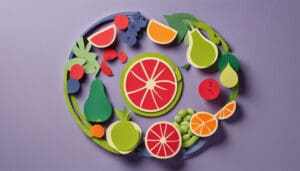You might think that with your hectic schedule, maintaining a balanced diet is next to impossible, but it’s more feasible than you’d expect.
As a nurse, your body is your most essential tool, and fueling it with the right nutrients can make a world of difference in your energy levels and overall health.
Incorporating a variety of fresh fruits, vegetables, lean proteins, whole grains, and healthy fats into your daily routine isn’t just about adhering to dietary guidelines; it’s about giving yourself the energy you need to face long shifts and demanding work.
Staying hydrated and choosing snacks wisely can also keep your blood sugar levels steady, ensuring you’re as prepared as possible to tackle the challenges each day brings.
Let’s explore how specific meal planning, strategic snack choices, and mindful eating can transform your workday, keeping you both energized and focused.
Key Takeaways
- Balanced meal planning with fresh fruits, vegetables, and lean proteins is essential for keeping nurses healthy and energized.
- Choosing nutrient-dense snacks like nuts, Greek yogurt, and hard-boiled eggs can provide sustained energy and support cardiovascular health.
- Staying hydrated by drinking water throughout the day and incorporating water-rich foods can help maintain energy levels and focus.
- Managing stress-relief eating by recognizing emotional hunger, finding alternative coping mechanisms, and emphasizing health and balance over strict dieting is important for nurses’ well-being.
Balanced Meal Planning
To maintain your health and energy through long shifts, it’s crucial to start with balanced meal planning that includes a variety of fresh fruits, vegetables, and lean proteins. Eating habits deeply influence how you feel and perform. By focusing on healthy eating, you’re setting yourself up to feel better and sustain your energy levels throughout demanding days.
Incorporate foods that stabilize your blood sugar, like high-fiber plant-based options, into your meals. This way, you’re less likely to experience the highs and lows that can come from sugary snacks. Speaking of snacks, choose nutrient-dense options such as nuts, Greek yogurt, and hard-boiled eggs. These snacks for nurses are perfect for on-the-go moments and provide a complete protein source, which is essential for muscle repair and energy.
Don’t forget to include sources of vitamin D and lean proteins like chicken or turkey in your diet. These elements are vital for bone health and maintaining muscle strength, respectively. Planning and packing your meals ahead of time can significantly reduce your reliance on processed foods, helping you make healthier choices even in the busiest of times.
Balanced meal planning is your foundation for a healthier, more energetic you.
High-Energy Snack Choices
For sustained energy during long shifts, consider incorporating high-energy snacks like nuts, Greek yogurt, and hard-boiled eggs into your diet. These choices fit seamlessly into your eating pattern, offering the perfect blend of proteins, fats, and carbohydrates to keep you feeling energized and ready to serve others.
Nuts, such as almonds and walnuts, not only support your cardiovascular health but also help in controlling blood sugar levels, making them an ideal snack for busy days.
Natural Greek yogurt, especially when chosen without added sugars, is a powerhouse of protein and amino acids, vital for muscle repair and boosting your immune system. Pairing it with a spoonful of peanut butter adds healthy fats and makes for a delicious, satisfying snack.
Don’t forget hard-boiled eggs, which are incredibly convenient and provide a high-quality protein source to fuel your body.
Adding portable fruits like apples and grapes to your snack rotation brings a burst of fiber and essential nutrients, offering a quick energy boost when you need it most.
And for those extra hectic days, RX Bars, crafted from wholesome ingredients, can be a lifesaver.
Don’t forget to drink more water throughout the day to stay hydrated and further support your energy levels and overall health.
Hydration Essentials
While focusing on what you eat is crucial, equally important is ensuring you’re properly hydrated to maintain your energy and focus throughout those demanding shifts. Hydration essentials aren’t just about drinking water; they’re about making choices that help you feel your best, even on the longest days.
Drinking water throughout the day is the foundation of staying energized and focused. A water bottle with measurements can be a practical tool, helping you track your daily intake and ensure you’re meeting your hydration goals. But it doesn’t have to stop there. Herbal teas and infused waters offer enjoyable alternatives that keep hydration interesting and can make you feel cared for.
Moreover, eating plays a role in how hydrated you feel. Foods that help, like watermelon, cucumbers, and citrus fruits, not only contribute to your overall health but also boost your hydration levels. These tips can help you maintain a healthy balance, ensuring you’re ready to serve others with the energy and focus required.
Stress-Relief Eating Strategies
Navigating the maze of stress-relief eating strategies begins with recognizing emotional hunger versus true physiological need. It’s crucial to identify if your desire to eat stems from actual hunger or if it’s a reaction to feeling tired, bored, or stressed. Instead of reaching for comfort foods, consider alternative stress-relief activities that can help divert your urge to eat. Going for a walk or indulging in a hobby can serve as healthier ways to cope.
Make sure to stay hydrated as well. Thirst can often masquerade as hunger, and drinking water can help alleviate those stress-induced cravings. Shifting your focus towards relieving stress through means other than eating is essential. It’s about finding healthier coping mechanisms that don’t revolve around food.
Manage emotional eating by removing the shame associated with body size and food choices. Emphasize health and balance over strict dieting. Make healthy, strategic choices in what you eat. This approach can stop eating from becoming a primary source of comfort and prevent weight gain.
Regular Meal Intervals
After exploring how to manage stress eating, let’s focus on the importance of regular meal intervals for maintaining your health and energy levels.
As nurses, you’re constantly on the move, caring for others, which can make it challenging to find time to eat. However, maintaining regular meal intervals is crucial to keep your energy up and stay on top of your demanding schedule.
Try to eat every 4 to 5 hours to prevent energy crashes and mood swings that can occur when you skip a meal. This practice helps maintain steady blood glucose levels, ensuring you have the energy needed for those long shifts.
Incorporating high-protein snacks, like nutrition bars or yogurt, can offer quick, convenient energy boosts. For those times when you can’t sit down for a full meal, quick snacks such as fruit or peanut butter with crackers can be lifesavers, keeping your energy levels stable.
Frequently Asked Questions
What Is a Healthy Diet for a Nurse?
To fuel your compassionate care, focus on a diet rich in plant foods, fiber, and full-fat dairy. Embrace intermittent fasting, snack on nuts and Greek yogurt, and manage meals with intention. Your health fuels your service.
Why Is a Healthy Diet Important for Nurses?
A healthy diet is vital for you because it keeps your energy up and supports your ability to care for others. It also maintains steady blood sugar and provides essential nutrients for long shifts.
What Is the Best Diet for Shift Workers?
Imagine working 12-hour shifts with no energy dips. A diet rich in whole foods, like lean proteins, whole grains, and plenty of fruits and veggies, ensures you’re always ready to care for others.
What Food Do Nurses Want?
You’re likely seeking foods that keep you alert and nourished during long shifts. Opt for snacks like nuts, Greek yogurt, and hard-boiled eggs. They’re easy, healthy choices that support your energy and focus.





